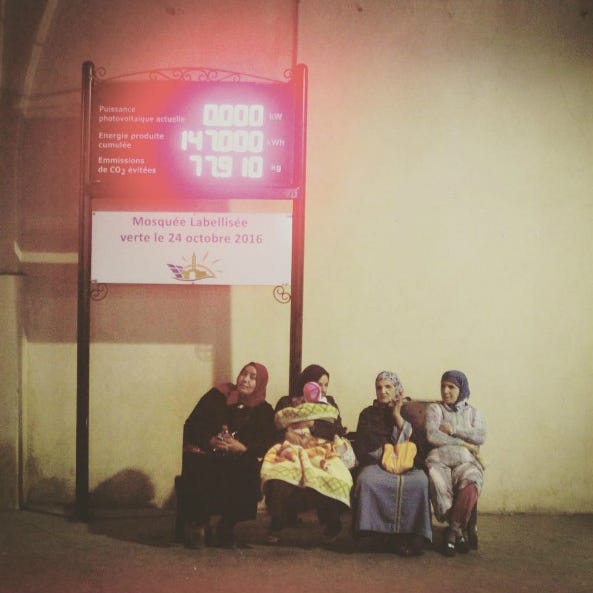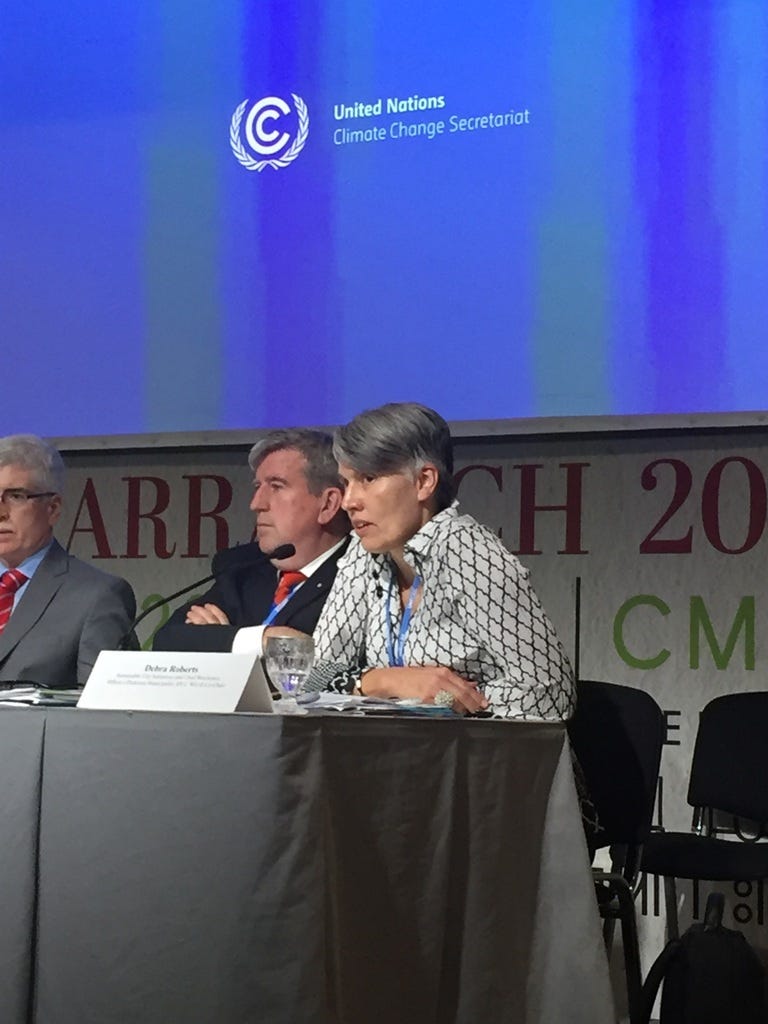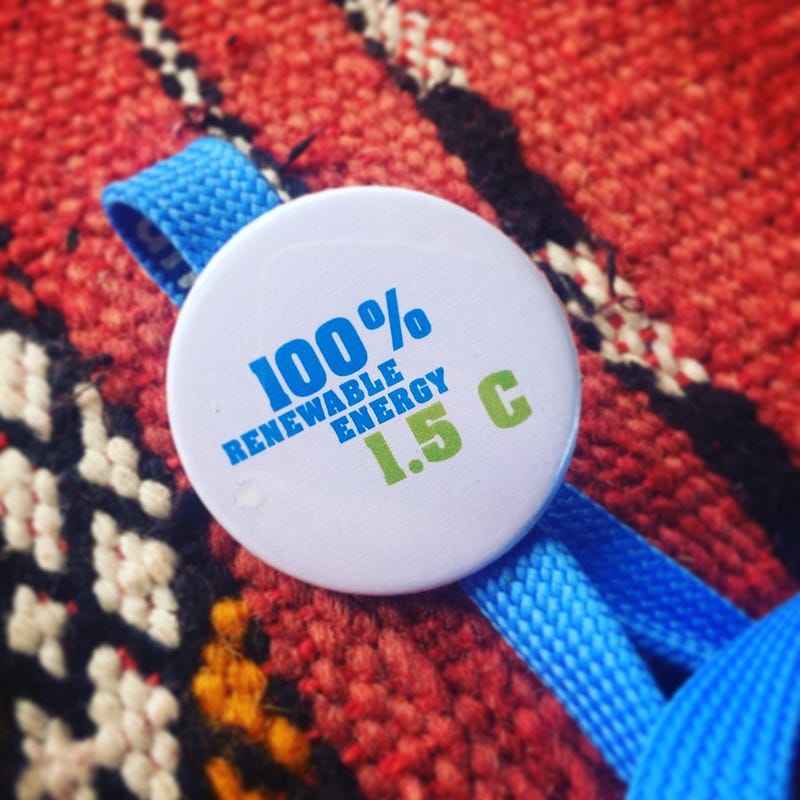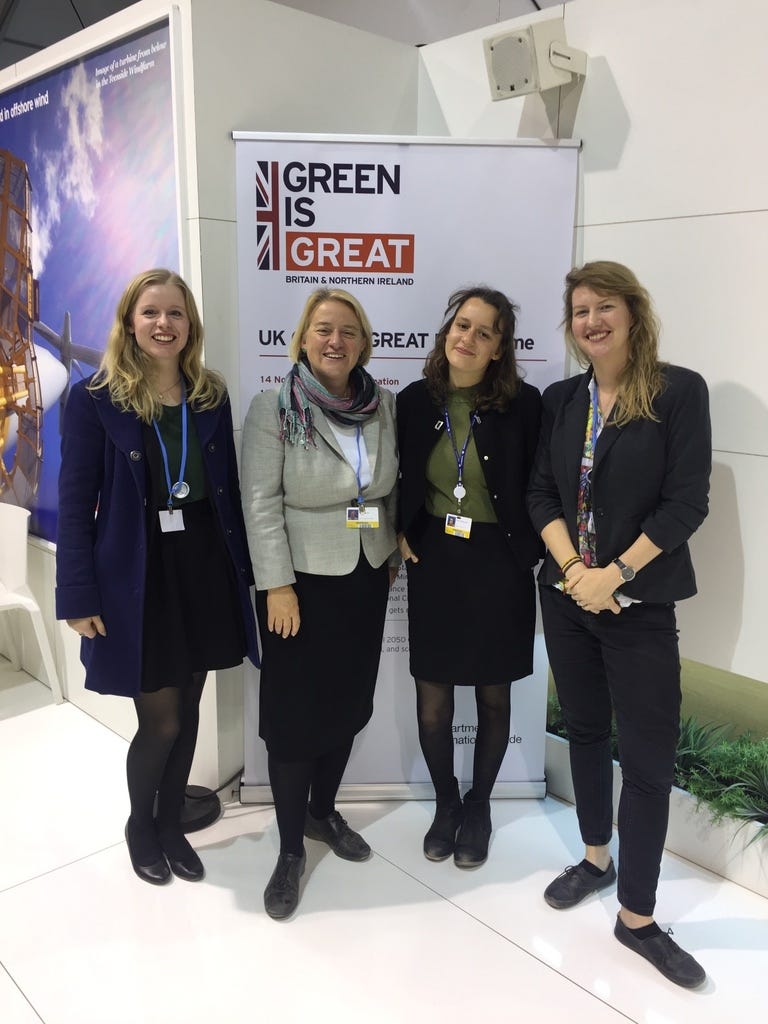By Ewa Iwaszuk

Four lovely ladies chilling under a sign that measures the solar power generated and emissions avoided by this Marrakesh mosque — certified green® since October!
Despite the COP being filled with big political personalities from around the world — from Ban Ki Moon, to John Kerry, to Akon (yes, really), my biggest personal highlight was bumping into and chatting with my currently #1 political crush and role model, Dr Debra Roberts, the Chief Resilience Officer of Durban in South Africa.
Over the past 20 years she worked to ensure that Durban becomes Africa’s “Most caring and livable city” — as the official city’s slogan states. Specifically, Dr Roberts has dedicated her life’s work to driving climate action in her city. Over the past two decades, she used a combination of political savviness, personal perseverance, and visionary understanding of the consequences climate change will have for her city to drive a climate adaptation strategy, that made her city of the most widely quoted example of a city successfully adapting to climate change.
Today, Durban has one of the most comprehensive and transformative local adaptation strategies in the Global South. The strategy not only integrates adaptation and mitigation efforts and mainstreams climate change adaptation in all aspects of local government operation but also puts forward transformative propositions: for instance it rethinks the food provision system for the city, redefining food from being a tradable commodity to being an important pillar of food security, and coming up with concrete solutions that serve to empower the poorest and most unprivileged groups in the city, promote urban and community-driven farming, supporting women and informal traders.

“I was too shy to take a selfie with my political crush, but here is Dr Roberts in all of her local-level-climate-champion glory”
Her work has, for most part, not been easy. In the early 2000s few local government officials were thinking about climate change action at local level; the climate change stream of the Environmental Protection and Climate Change Department Dr Roberts has led did not receive official city funding until 2010 — in the meantime, apart from relying on international projects, Dr Roberts had streamlined her personal honoraria for international consulting work she has performed to fund local adaptation projects.
While the negotiations of the national delegations have been dragging on for the past few days in informal meetings and high level segments — with some progress and pledges made (although well below the civil society expectations) and many decisions postponed for the future, the COP venue is buzzing with informal conversations, side events, panels and networking of non-state actors, who, rather than using their energies on influencing the negotiators to make more progress, take matters in their own hands to drive transition to carbon neutral, resilient, environmentally and socially just communities.

The go 100% RE initiative engages countries and non-state actors in transition to 100% renewable energy
The COP has seen a launch of Global 100% Renewable Energy where 300 cities, 81 corporations and thousands of smaller businesses as well as the world’s 48 most vulnerable countries outlined their plans to go 100% renewable to reach the 1.5C warming target; the former mayor of Winnipeg, Glen Murray presented the city’s achievements in cutting emissions reached despite Canadian Prime Minister’s hostile climate policies and the country being pulled out of Kyoto Protocol; energy prosumer initiative explained the benefits decentralizing energy systems will have for decentralizing political power; and California, the world’s 6th biggest economy, made enquiries about whether it could join the UNFCCC process as a sub-national actor, should the US pull out — [although with such a recommendation, it might just as well not — ]
I am well beyond the point of believing that my personal lifestyle changes, and isolated individual actions are, alone, going to change the world. I cycle, don’t eat meat and drink tap water because it makes general sense, but on it’s own — even if I convince 20 friends to do the same, it will have negligible effect. However, engaging in local-level activities is a different matter altogether, and youth organizations, such as the many local members of the Naturefriends network, with their capacity to educate and drive local change in their communities have a crucial role to play in this.
During the COP, the European Youth Forum’s delegation, together with yours truly has had a chance to have a chat with Natalie Bennett, a former leader of the Green Party in England and Wales. In this refreshingly honest conversation, the politician underlined the need to politically engage youth and children from the youngest age, encouraging them to campaign for matters that affect them or take part in decisions in their schools and communities they belong to.

European Youth Forum delegation had an interesting conversation with Natalie Bennett about promoting political engagement of youth
I am not trying to say we don’t need those international processes: Canada’s tar sands operations, Saudi Arabia’s oil fields and UK’s coal-powered steel factories are beyond the sphere of influence of any sub-national level or non-state body or; but there are also ways of engaging with the international processes in a creative manner to acknowledge the progress being driven by non-state actors. While Dr Robert’s achievements have long not been recognized by her own local government, her work has rose to international fame. She is recognized to be so much of an expert in local climate action, that she was a lead author of the IPCC 5th report on Urban Areas and is now a co-chair of the entire IPCC Working Group on Adaptation for the 6th report (in case you are not familiar with the IPCC process: those achievements are, in order, a BIG DEAL and a MASSIVE DEAL). She is now using her leading role in the body that is mandated with the task of mobilizing all available climate knowledge to redefine the IPCC’s geography of interest: the future reports are to provide local and regional, rather than only country-level estimates of predicted climate impacts, to recognize and better inform the level where the climate revolution is truly happening — today, not at the next high level meeting of the heads of state.
Ewa Iwaszuk, official delegate of IYNF and European Youth Forum in the COP22.
